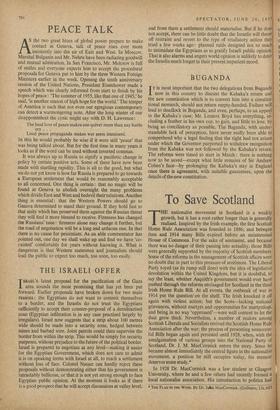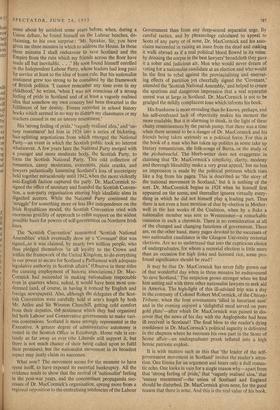To Save Scotland
THE nationalist movement in Scotland is a weakly growth, but it has a root rather longer than is generally realised. Inspired by the Irish example, the first Scottish Home Rule Association was founded in 1886; and betwgen then and 1914 many Bills expired before an uninterested House of Commons. For the sake of sentiment, and because there was no danger of their passing into actuality, those Bills were generally supported by the majority of Scottish members. Some of the reforms in the management of Scottish affairs were no doubt dtie in part to this pressure of sentiment. The Liberal Party toyed (as its rump still does) with the idea of legislative devolution within the United Kingdom, but it is doubtful, to say the least, whether Asquith's government would ever have pushed through the reforms envisaged for Scotland in the third Irish Home Rule Bill. At all events, the outbreak of war in 1914 put the question' on the shelf. The Irish knocked it of again with violent action; but the Scots.—lacking national grievances, without martyrs and opportunities for martyrdom, and being in no way 'oppressed'—were well content to let the dust grow thick. Nevertheless, a number of zealots among , Scottish Liberals and Socialists revived the Scottish Home Rule Association after the war; the process of presenting unsuccess- ful Bills began again and persisted until 1928, when, with the amalgamation of various groups into the National Party of Scotland, Dr. J. M. MacCormick enters the story. Since he became almost immediately the central figure in the nationalist movement, a position he still occupies today, his memoir deserves some study.* In 1928 Dr. MacCormick was a law student at Glasgow' University. where he and a few others had recently formed a local nationalist association. His introduction to politics had come about by accident some years before, when, during a Union debate, he found himself on the Labour benches, de- claiming, to his own snrprise : `Mr. Speaker, Sir, you have given me three minutes in which to address the House. In those three minutes I shall endeavour to save Scotland and the Empire from the ruin which my friends across the floor have made all but inevitable. . . .' He soon found himself enrolled in the Independent Labour Party, whose leaders had long paid lip service at least to the idea of home rule. But his nationalist sentiment grew too strong to be contained by the framework of British politics. 'I cannot remember any time even in my childhood,' he writes, 'when I was not conscious of a strong feeling of pride in Scotland and of at least a vaguely realised idea that ,somehow my own country had been thwarted in the fulfilment of her destiny. Events recorded in school history hooks which seemed in no way to disturb my classmates or my teachers caused in me an uneasy resentment.'
His 'strong feeling of pride,' vaguely realised idea,' and 'un- easy resentment' led him in 1928 into a series of bickering, hair-splitting negotiations from which emerged the National Party—an event in which the Scottish public took no interest whatsoever. A few years later the National Party merged with a younger and more moderate body, the Scottish Party, to form the Scottish National Party. This odd collection of romantics, canny moderates, extremists, plain cranks, and lawyers pedantically lamenting Scotland's loss, of sovereignty held together miraculously until 1942, when the more violently anti-English faction captured the party. Dr. MacCormick re- signed the office of secretary and founded the Scottish Conven- tion, a non-party organisation uttering high idealistic aims in dignified accents. While the National Party continued the 'struggle' for something more or less like independence on the Irish Republican model, the Scottish Convention tried with enormous gentility of approach to enlist support on the widest possible basis for powers of self-government on Northern Irish lines. The 'Scottish Convention' summoned 'Scottish National Assemblies' which eventually drew up a 'Covenant' that was signed,..so it was claimed, by nearly two million people, who thus pledged themselves 'in all loyalty to the Crown and within the framework of the United Kingdom, to do everything in our power to secure for Scotland a Parliament with adequate legislative authority in Scottish affairs.' (Observe in these titles the cunning employment of historic associations.) Dr. Mac- Cormick had succeeded in making nationalism respectable even in quarters where, naked, it would have been most con- demned (and, of course, in having it noticed by English and foreign newspapers). Also, although the delegates of the Scot- tish Convention were carefully held at arm's length by both Mr. Attlee and Sir Winston Churchill, getting cold comfort from their deputies, the sentiment which they had organised led both Labour and Conservative governments to make vari- ous concessions. Scotland is more strongly represented in the Executive. A greater degree of administrative autonomy is vested in the Scottish Office in Edinburgh. Home rule is cer- tainly as far away as ever (the Liberals still support it, but there is not much chance of their being called upon to fulfil their promises), but the nationalist movement in its broadest aspect may justly claim its successes.
What now? The movement seems for the moment to have spent itself, to have exposed its essential bankruptcy. All the evidence tends to show that the revival of 'nationalist' feeling in the post-war years, and the concomitant propaganda suc- cesses of Dr. MacCormick's organisation, sprang more from a regional opposition to the centralising tendencies of the Labour Government than from any deep-seated separatist urge. By careful tactics, and by phraseology calculated to appeal to Scots of any party or of none, Dr. MacCornaick and his asso- ciates succeeded in raising an issue from the dead and making it walk abroad as if a real political blood flowed in its veins: by dressing the corpse in the best lawyers' broadcloth they gave it a sober and judicious air. Men who would never dream of voting for a nationalist candidate at an election and who would be the first to rebel against the provincialising and enervat- ing effects of partition yet cheerfully signed the 'Covenant,' attended the 'Scottish National Assembly,' and helped to create the spurious and dangerous impression that a real separatist unrest was at large in Scotland. Dr. MacCormick is not to be grudged the mildly complacent tone which informs his book.
His frankness is more revealing than he knows, perhaps, and his self-confessed lack of objectivity makes his memoir the more readable. But it is alarming to think, in the light of these chatty reminiscences by the parish pump, that there was a time when there seemed to be a danger of Dr. MacCormick and his friends being taken seriously as a political force. For this is the book of a man who has taken up politics as some take up literary romanticism, the folk-songs of Barra, or the study of the piobaireachd. The blurb-writer does not exaggerate in claiming that 'Dr. MacCormick's simplicity, clarity, modesty and thorough likeability make a very great appeal,' but no less an impression is made by the political pettiness which rises like a fog from his pages. This is described as 'the story of the national movement in Scotland,' but it is nothing of the sort. Dr. MacCormick begins in 1928 when he himself first appeared on the scene, and thereafter ignores virtually every- thing in which he did not himself play It leading part. Thus there is not even a bare mention of that by-election in Mother- well in the last weeks of the Coalition, when by a fluke a nationalist member was sent to Westminster,---a remarkable omission in such a chronicle. There is no consideration at all of the changed and changing functions of government. There are, on the other hand, many pages devoted to the successes of two nationalist candidates in the Glasgow University rectorial elections. Are we to understand that into the capricious choice of undergraduates. for whom a rectorial election is little more than an occasion for high jinks and licensed riot, some pro- found significance should be read?
It may be that Dr. MacCormick has never fully grown out of that wonderful day when in three minutes he endeavoured `to save Scotland.' The suspicion grows stronger when we find him setting sail with three other nationalist lawyers to seek aid in America. The high-light of this ill-advised trip was a day in the company of Colonel Robert McCormick, of the Chicago Tribune, when the four covenanters 'idled in luxuriant ease' and in the evening enjoyed a 'delightful meal served on pure gold plate'—after which Dr. MacCormick was pained to dis- cover that the news of his day with the Anglophobe had been ill received in Scotland ! The final blow to the reader's dying confidence in Dr. MacCormick's political sagacity is delivered in the chapters where he recounts his own part in the Stone of Scone affair—an undergraduate prank inflated into a high heroic patriotic exploit.
It is with matters such as this that 'the leader of the self- government movement in Scotland' invites the reader's atten- tion. One likens for an argument and hears only a dull roman- tic echo. One looks in vain for a single reason why—apart from that 'strong feeling of pride,' that 'vaguely realised idea.' that 'uneasy resentment'—the union of Scotland and England should be disturbed. Dr. MacCormick gives none, for the good reason that there is none. And this is the real value of his book.


















































 Previous page
Previous page